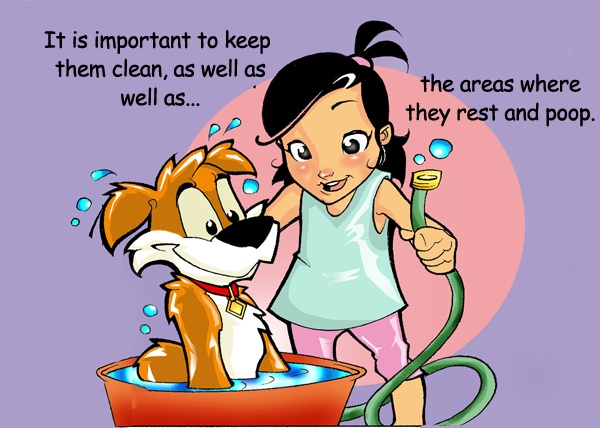HOW TO TAKE CARE OF YOUR PET?

Now that you've brought your new friend home, it's time for the fun part -- and the hard part! This is your chance to really prove to your parents, yourself, and your pet that you're a responsible guardian.
It's a lot to live up to, but don't worry-you can do it! All you need to know is what your pet's needs are, then meet them. Basically, most pets rely on us for:
Food
- Be sure you know the diet and feeding schedule of your new pet. Get information from your veterinarian or the pet store.
- Most animals need to be fed once or twice a day. Sometimes baby animals need to be fed more.
- Don't ever give your pet table scraps -- people food (especially chocolate!) can make most animals sick.
- Introduce changes to food or feeding time gradually -- food changes can be stressful for an animal.
- Feed your pets in a quiet, protected place, so they feel safe and comfortable when they eat.
Water
- Make sure your pet has plenty of clean, fresh water.
- Water should be changed at least twice a day.
- If your pet is a fish or turtle and lives in water, be sure to clean the tank at least once a week.
Shelter
- Your pet needs a place to call home -- whether that's a tank, cage, or doghouse.
- If your dog or cat spends a lot of time outdoors, make sure shelter is available at all times. Shelter keeps pets protected from cold, wind, and rain in the winter and from the harsh hot sun in the summer.
- Even if your pet spends most of the day outdoors, he should sleep indoors at night. This will protect him from cars, bad weather, and animals such as coyotes that will attack pets.
- When it comes to shelter, remember that animals who are treated like part of the family are better-adjusted and will be more closely bonded to you. And after all, your pet IS part of your family, right?
Potty
- All animals need a place where they can go to the bathroom. Unless you're able to train them to use the toilet, cats need a litter box, gerbils need a cage, and dogs need to go outside or in a special lined area.
- Make sure you create a safe place for your pet's bathroom needs and -- this is REALLY important -- clean it regularly! After all, think about how gross it is to use a toilet that doesn't flush.
- If you have a dog and live in an apartment with no yard, you need to make sure your dog is walked often. If he goes in a public place, be sure to pick it up and dump it in a trashcan.
Exercise
- Dogs need plenty of exercise. Physical activity keeps them healthy, happy, and fit. Make sure you walk, run, hike, or play fetch with your dog every day. Not only is exercise good for your pup, but it's good for you, too!
- Cats, especially if they live indoors, also love some quality playtime with you. This is a chance to have fun and get creative with cool cat toys.
- Rodents like hamsters and gerbils will thank you for putting an exercise wheel in their cage to make life a little more interesting.
Grooming
- It's a good idea to brush and comb your pets every day to get rid of loose or shedding hair.
- Poke around to check for fleas, ticks, leaves, and other things that might be tangled in your pet's fur.
- If you can, bathe dogs once a month and cats every few months. But don't overdo it! Too many baths take away the natural oils from a pet's skin and can cause itching or rashes.
- Cats will have fewer hairballs and shed less if they're combed on a regular basis.
- If your pooch has killer doggie breath, try brushing his teeth when you bathe him.
Training, if you have a dog
- Yes, Bowzer is your buddy, but you need to be his boss! If you don't set up rules for him to follow, he may act aggressively and out of control. You don't want your dog dashing into oncoming traffic, jumping on little kids, or growling at your neighbors, right? So you need to set up rules for him to follow and help him follow them.
- You can do this in a very gentle manner without raising your voice or becoming mean. Work with your parents to determine the rules of the house. If there's a "no dogs on the sofa" policy, don't let Spot on the couch the minute your parents leave the room. It's best when all of you work together to teach your new family member how to behave.
- An obedience class is a great way to learn how to speak a dog's language and teach her the rules of your household. But don't expect her to be perfect -- there will be accidents! Just be patient and loving, and eventually the hard work will pay off.
Health care
- Just like we need annual checkups with our doctor and dentist, most pets need regular checkups, too.
- Veterinarians, or animal doctors, check your pet's general health, can answer any questions you might have, and make sure your pet's vaccinations are up-to-date.
- If you bring home a new dog or cat, you should take him to the vet right away to get checked out.
Love & affection
- Just like people, pets thrive on attention! The more love you give, the more you'll get back.
- Give your pet plenty of hugs, kisses, gentle pats, and love. Okay, so maybe you can't pet a fish, but you can still show you care by talking to it, watching it, and feeding it special treats.
Get your house ready for a new pet
Before you bring a new animal into your home, make sure your house is pet-ready. Take a tour around your home and yard with your parents, using this as a checklist:
- Are there any holes, broken concrete, drains, or swimming pools that your pet could fall into or get stuck in? They need to be fixed before your pet arrives.
- Are there any gaps in the fence, or a broken gate, that might allow your new pet to get out of your yard?
- Are there any poisons, like snail bait, antifreeze, or other toxic chemicals just sitting out? These things are super-poisonous to animals. Make sure containers are stored away in locked cupboards far out of reach.
- Check for dangling electrical cords in the house or outside. Puppies, kittens, and rodents love to chew them, thinking they're toys. Cover cords or tape them down with industrial tape.
- How about your toys? Do you have any Legos or other small pieces lying around that an animal could choke on? Keep your things out of reach of little paws.
- What about stuff that breaks? If you don't want something to get knocked over or stepped on -- maybe your mom's valuable vase or your favorite model airplane -- put it up high or away for a little while.
Pet "Don'ts"
- Don't use insect sprays and weed killers around your pets or allow antifreeze to spill in any area where pets hang out. If animals get poisons on their fur or paws, then lick themselves, they can get very sick or even die.
- Never leave a pet alone in a car on a hot day-even with the windows cracked open. Temperatures can go up quickly and cause an animal to overheat, which is sometimes fatal.
- Don't ever feed your pet chocolate, no matter how much they might beg. Dogs can't digest chocolate and can die from eating too much.
- Don't let your dog wander the neighborhood without you. She could get lost, hurt, or catch a disease from another animal. Always keep her on a leash when in public areas, like a park or busy street.
- Never give pets human medicine. Keep all medicines -- human or pet -- out of your pet's reach.
resources:http://pbskids.org/itsmylife/family/pets/article7.html



